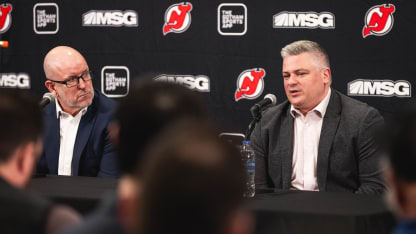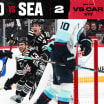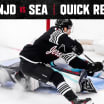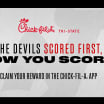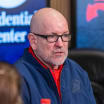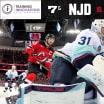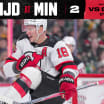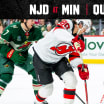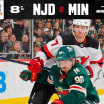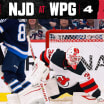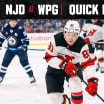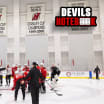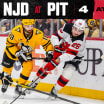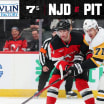The following is a partial transcript of this morning's press conference with New Jersey Devils General Manager Tom Fitzgerald and head coach Sheldon Keefe:
You can watch the press conference in full here.
QUESTION: Now that you’ve had a week to kind of reflect on things, just your overarching thoughts on year one for you, Sheldon, and on this year overall for you, Tom?
FITZGERALD: Over the summer, or last spring actually, probably close to a year ago, when we brought Sheldon on board, the goal was to create a standard that playoffs are a year-in-year-out thing. And when you look back, yeah, it was disappointing, being knocked out in five games. But when you look at the big picture, there’s still a lot of growth for this team to grow. But we’re not gonna kick to the curb, making the playoffs was a subpar season ‘cause it wasn’t. It was a goal of ice right from the get-go. Sheldon’s never not made the playoffs. So those standards are… and expectations were heightened, for sure. So, no, I think, again, looking back, I think it was a good year. Now, was it a great year? No. It was disappointing that we got knocked out in five games. But the fun part is the start to build around what we’ve created here.
Q: Sheldon, specifically digging in this year, I’m curious as you’ve looked back now on the last, over the last week, was there anything in particular you can pinpoint that maybe changed or that you’re trying to figure out where your team went from that December stretch where it was playing such dominant hockey, then the break came and never quite got back to that again?
KEEFE: I think for me, that’s gonna be a big project for this summer to really dig in. There’s surface level things that come to mind, and there’s things that you feel as you go through it. But for me, we gotta dig a little bit deeper on that. I would say the overriding thought for me, though, is, if I reflect on where we were a year ago coming in here, I really wanted to work to establish a foundation that we could build upon to be a consistent contender in the playoffs, and making the playoffs consistently. And then building out our game from there and giving us every chance to compete for the Stanley Cup. And for me, when I look back, if I’m looking at the positive part of it, I look at that — to me, there is a foundation here now. There’s an expectation in terms of what the standard is to not just make the playoffs, but all the things that go into it to be a team that can compete in the playoffs.
And to answer your question directly, for me, we showed an inability to sustain our game. And that’s the hardest thing to do in the league, is to sustain your game, year over year, throughout a season. To me, our foundation is in place to continue to build upon. Clearly, we have to continue to get better. We want to sustain our level of play year over year. And to me, we were unable to do that throughout our season. And that’s what we’ve got to continue to raise the standard, continue to push our group to find that level of consistency that we can sustain play over long periods of time, and to overcome adversities. Those are things that I think I’ve talked about since the day I got here. And that’s really where I feel that we’re at. We took steps this season, without question. For me, when I reflect on it, my message to a lot of the guys is there’s a foundation here now, but when I look at it, to me, we finished 16 out of 32 teams in the regular season. That’s average. And we’re not here to be average. We wanna be better. And we will get better individually, collectively, myself as a coach. Our players individually will have to continue to improve so we can get that level of sustainability that is required to compete in the league.
Q: Tom, you had a group that sustained a lot of injuries. And one of the things that we've talked about, particularly with Sheldon throughout the year, is just overcoming those things when your back is against the wall, when you have adversity. From your point of view, as a general, what did you see from your group in that aspect?
FITZGERALD: Well, the adversity that the group had, and Sheldon said it in the off-season last year, we wanna create an environment where the standard of play, which he's talked about, is sustainable, whoever's not in your lineup or whoever's in your lineup. And I think when you look back, the style of play just didn't change the mindset in where we had to go as a group, whoever was in the lineup or who wasn't in the lineup. So I give the players a lot of credit. I do think there's been a lot of growth. I am excited about the expectations that Sheldon and the standard he has set for this group that were probably a little sticker-shocked at the start or throughout the year, that they're used to, and they're gonna be, "This is what is expected," and I'm excited about that. You can't control injuries, so it doesn't matter who's in the lineup, who's not in the lineup. We create an identity. We play one way, the right way, a certain way.
Q: Tom, knowing what happened here at the end of the season, is there anything… And you made a lot of great moves at the trade deadline, but is there anything more, after what you’ve seen, that you need to do to get this team over the hump?
FITZGERALD: I like our group. My job is to continue to better the group.
You know, we’ve got a lot of decisions to make on certain players, whether we bring guys back, trade players.
We won’t be coming back with the same group, I could tell you that, ‘cause it wasn’t good enough. So at the deadline, you know, you weigh everything out, where we’re at healthwise, where people—who is available—what are the acquisition costs. My mindset, and I think I said it after the deadline, was I felt it was no secret what I was looking for at the deadline, what I felt this team needed positionally, and went hard at it. Made some real quality offers. However, we didn’t get the people that we tried to get.
And when you look at some of the additions that we did make, it was to offset some of the depth that we probably were lacking in certain positions. I look at bringing Brian Dumoulin and how well he played. There were a lot of games where I was like, “Thank God we made that move,” how much he helped us and helped this group continue to grow and believe and get to the playoffs.
Even the other forward positions, Cody Glass and Sprong, they gave us a little more depth than we had.
So, with that being said… and I think I said it too, scoring goals is a hard thing to do in this league. It’s not easy. But we had to figure out different ways to score because of personnel—grinding goals out, getting to the net front, getting to the hard ice, getting in front of the goalie, screens, tips, things like that. And we needed certain guys to pick the pace up a bit as well.
Q: It seemed like the primary focus was keeping the puck out of the net. Defense and goaltending. You said you weren’t worried about offense. So just, in hindsight, looking back on the season, how—what was your assessment of how your offense performed this year?
FITZGERALD: Oh, I think players underachieved, for sure. I think players who have scored enough goals in this league to give assurance that we have depth scoring, didn’t.
I said it just moments ago, scoring goals is extremely tough to do in this league. I bang my head against the wall every day, wondering, really, what is depth scoring?
I’ve asked my team, I asked my analytics group. Like, “Tell me what it is.” What is it the great teams in this league have in depth scoring? Is it 12, 20-goal scorers? No, we know that’s not real. Is it 12, 10-plus goal scorers? Possibly. That’s our goal.
But again, it’s being able to put the puck in the net at the appropriate time, consistently, that we didn’t see this year.
So when I talked about depth scoring earlier—last year—it was really the last on my to-do list because we had to get better in other areas. [laughs] We had to keep the puck out of our net. We had to defend better. We had to move pucks up the ice more effectively.
Right now, and I’ve said it again, I think it proves that the tic-tac-toe plays aren’t always there. And getting ugly goals is as good as a tic-tac-toe goal.
Q: Three of the last four seasons, Jack’s had season-ending injury. Is there any long-term concern with him to stay on the ice and build around him as your centerfold?
FITZGERALD: I don’t… Concern is, that’s a strong word. I think, it’s not that you don’t think of that. But when you have a top player like that not playing, you know, no one plays 100% of the games. But the top guys pretty much play the majority of the games. I think, I’d like to think Jack’s shoulder injuries are behind him now. But you just, you never know. I don’t go into a roster build thinking, “Can we rely on so-and-so or so-and-so?”
You know, Jack knows the work that’s ahead of him this summer and where he needs to go, from a strength-wise and a body makeup. And it’s not just snapping your fingers, there’s a process to that. And he’s been going through it. And we’ve seen him grow. We’ve seen his body mature, from his first year, second year. And here we are six years later. You know, he’s got that man body. But I don’t worry about it.
Probably easier to say I don’t worry about it than worry about it, meaning, ‘cause it’s happened. Injury’s a funny thing. You just, sometimes you have bad luck.
Q: Tom if you could maybe update us on Kovacevic and where he is right now, if he had surgery or…
FITZGERALD: He had surgery today. Successful surgery. Timeframe is he will not be at the start of training camp.
Q: Sheldon, at the end of the regular season, there were still players saying that the team was trying to find its own identity. Do you feel like the effort that you guys put forth in the Carolina series kinda helped to show what that identity that you’d like to see on this team?
KEEFE: I think there’s elements of that, for sure. I think we found another level within that series to be able to compete. And, you know, ultimately fell short, obviously. But there’s signs in there. I think for me, if we’re really pinpointing, you know, the second half of the season with the injuries and such, you kinda lose your way a little bit. And you’re trying to reestablish an identity when you’re losing key people.
But for me that stretch of time right before Christmas was a great indication of what we’re capable of doing and what we wanted to look like. We weren’t able to sustain that for long enough periods of time, which is why it was as hard as it was for us down the stretch to make the playoffs, and then ultimately to compete in the playoffs.
But there’s going to be plenty of clips, plenty of images and illustrations of what our identity looks like. And that’ll continue to evolve as our players improve and as our team changes through an offseason. But, like I said, there’s real good chunks of time in the season that are representative of what we want this group to be about. And we’ve gotta find ways to sustain it for longer periods.
Q: For Sheldon, how much does Nemec’s situation just speak to how important confidence is for a player?
KEEFE: Yeah, it’s really important. You know, confident players are usually thriving and feeling good.
There’s also the part of it—you have to earn your confidence. You’ve gotta put in the work, you’ve gotta gain experience. And I think Nemec went through a lot of that this year, whether it was from the start of the season in training camp and not quite being ready for the level and the standard and the expectations, to going down to the minors and finding his way through it, and coming back.
I thought he just kept getting better and better with the more experience that he got. And I think he leaves with a much better understanding of what the league is about, and what’s required, and what the standard is here now versus what maybe he came into. It’s a different circumstance, and he’s gotta earn his confidence every single day. And then as a coaching staff, we’ve gotta give him the appropriate opportunities that meet the work that he puts in and allow his talents to get going.
Q: Sheldon, can you speak to the importance of your captain this year? Hischier’s kind of a quiet, mild-mannered guy. What was his importance to you and your staff your first year here in Jersey?
KEEFE: Well, he was huge. The first thing is the on-ice component of it — just his play. I’ve said it many times before that I don’t think I gave him an easy shift the entire season in terms of matchups, deployment, faceoffs, starting in his own zone, power play, penalty kill. He took on so much and, to me, did a stand-up job. There are tremendous players nominated for the Selke this year — all are deserving — but Nico’s right there with those guys. As his coach especially, it’s evident. He’s got a long future of being considered for such an award and others, because he still found a way to score at a high rate for us as well. A tremendous player that I’m fortunate to have. In terms of his leadership and his ability as a captain, I was really impressed. You mentioned he’s mild-mannered. I think he’s still growing and evolving into the role, but I saw a guy that spoke up when needed, said something on the bench, and set the tone for the team at different times. The support that Fitz brought in for him last offseason — the leadership and veterans that could support him and grow the leadership group — I think really empowered him. Those guys see great abilities in him, both on the ice and the ability to lead. He was a tremendous asset for me and our team, and I’m fortunate to have him. He’s obviously going to be a big reason why this team can continue to build on its foundation.
Q: Tom, I’m just curious — as you and your group look ahead and plan for free agency, after the success that St. Louis had with offer sheets last offseason, are you anticipating that becoming a more widespread event around the league now?
FITZGERALD: I do, actually. It’s a tool to improve your team. But you have to have the cap space. You probably have to strategically target players to do it, knowing full well that there’s no way a team can match because they don’t have the cap space. A lot of teams have a lot more cap space. I think teams will try to do it — I just don’t know how successful they’ll be. I think the most important part of offer sheets is the player has to want to move. He’s got to want to come to your team. There’s that period where RFAs — you can talk to them. They probably have to initiate it themselves.

